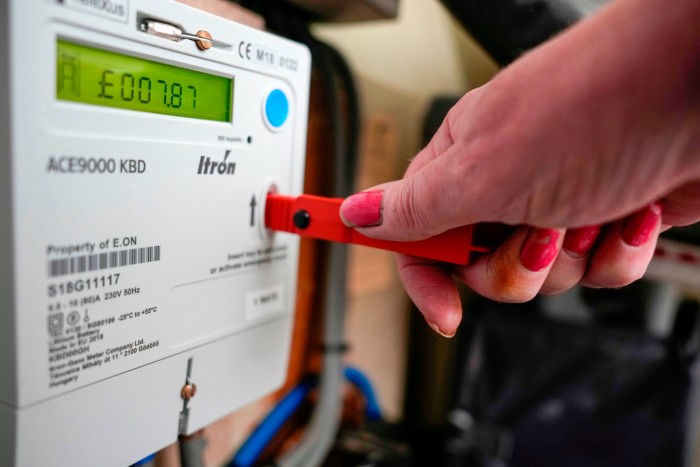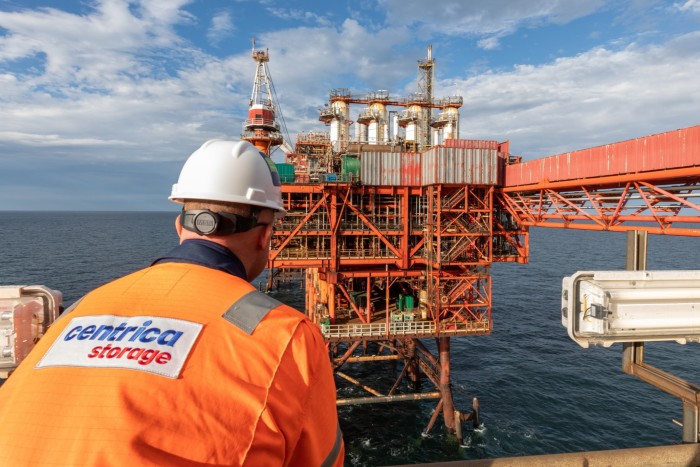The chief executive of British Gas’s parent company has said that all households in Britain will face higher energy bills if suppliers are unable to prevent struggling customers from running up large debts.
The warning by Centrica’s chief executive, Chris O’Shea, follows an industry-wide moratorium on the forced installation of prepayment meters in February after British Gas was caught up in a scandal involving third party contractors breaking into vulnerable people’s homes to install the devices.
In his first major interview since the scandal, O’Shea conceded that errors had been made, but argued the government must find a fair way to spread the costs of supporting the most vulnerable in society.
“It’s all very well saying, we are going to stop X, Y and Z . . . [but] ultimately if you have people in categories where you can’t install a prepayment meter, then the general population is paying for their energy,” he told the Financial Times.
On Tuesday, Centrica said in a trading update that its performance had been strong so far in 2023 thanks to “significantly higher” earnings from British Gas, though earnings per share were still expected to decline by about 30 per cent from last year.
The boost from British Gas comes from a regulatory switch that has allowed energy suppliers to already reclaim some costs of supplying customers during the energy crisis.
Ofgem, the regulator, is considering allowing suppliers to levy other extra charges on all energy bills to cover the costs of bad debts run up by struggling households, as part of changes to limit the installation of prepayment meters.
“If bad debts go up because of this, Ofgem will have to increase the price [suppliers can charge],” O’Shea said.

Energy UK, the trade group, has estimated that the moratorium on forced prepayment installations is adding about £30mn per month to customer debt levels nationwide — the equivalent of about £1 per household per month. The cost of bad debt currently accounts for about 1 per cent of typical bills.
O’Shea also said he remained “hugely” concerned about country’s “energy resilience” given the UK’s lack of gas storage.
Centrica reopened Rough, Britain’s largest gas storage facility, in October last year, having closed it to new injections five years earlier. But it warned at the time it was not a “silver bullet” to solving energy security concerns over the winter months, as the site was able to meet just 1 per cent of demand on a cold day.
O’Shea was “disappointed” that talks with the government over support for further development of Rough had fallen through last year. “I worry hugely about the UK’s energy resilience,” he said. “I worry hugely about the real lack of gas storage. We have less than 10 days peak winter demand.”
The warning comes as the initial impact of the energy crisis — caused by Russia cutting off gas supplies to Europe following its full-scale invasion of Ukraine — starts to ease.
But with bills still expected to remain well above levels before the war in Ukraine for several years, the government is looking at ways to protect lower income households — such as the introduction of a “social tariff”.
O’Shea argued that “policy costs” resulting from such a move should be funded out of general taxation, rather than following the usual formula of adding them on to energy bills.
Centrica is one of Britain’s largest energy companies, with assets ranging from North Sea oil and gasfields, an energy trading division and a 20 per cent stake in the company that operates the UK’s nuclear power plants.

O’Shea echoed widespread industry complaints of “real problems” in getting new connections to the grid, which he said were delaying investments in new power generating capacity. “It’s very frustrating, because it’s very easy to fix,” he said.
He urged the government and regulator to ensure that developers had to put down a large deposit to join the waiting list for new grid connections to weed out those with “no financial substance”.
Last week, Centrica opened its first large solar farm, an 18 megawatt project in Wiltshire, and it plans to build up to 900MW of renewable and flexible generation assets, which include gas-fired power stations, by 2026.
O’Shea said he was interested in investing in Sizewell C, the new nuclear power plant on the Suffolk coast, depending on the level of risk and reward investors were asked to take on. The project is led by EDF, the French state-owned energy company, which holds the other 80 per cent stake in the UK’s existing fleet of nuclear power stations.
But he added that he was “eternally grateful” the company had not invested in Hinkley Point C, the nuclear plant EDF is building in Somerset, which has been beset by delays and cost overruns. The 3.2GW plant is being built using a different funding model that means investors have to wait until it starts generating before seeing any returns.
Before making any decision on longer-term investment plans, however, O’Shea said he needed to spend more time on the delicate issue of forced prepayment meter installation. Ofgem has set a number of conditions for any supplier to restart forced instalment.
“It’s not imminent,” O’ Shea said. “We made mistakes on this — very public mistakes — I’d rather take the time to get it right than rush back into it.”












